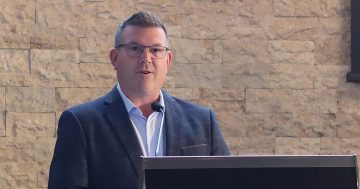John Eades* says great leaders need to be challenged — and COVID-19 is providing some of the greatest challenges in decades.
 Every adverse event has negative and harmful consequences. COVID-19 is no different.
Every adverse event has negative and harmful consequences. COVID-19 is no different.
It has brought sickness and death along with drastically changing our way of life — but in darkness, there is always light.
Even though the light might be challenging to see at times, it reveals itself eventually.
I recently told a group: “Only leaders who are tested become great.
“This pandemic has tested us, and because of that, better leaders are being created.”
Take Jerome, a chief executive of a medium-sized technology firm, as an example.
Pre-pandemic everything was fine with his company.
Overall performance was at an above-average level, management was on the same page, and he felt his company had solidified itself as a market leader.
Then COVID-19 sent a wrecking ball through his industry and company.
Overnight the business lost 30 per cent of its revenue, team members transitioned to remote work, and uncertainty punctured everyone’s mind.
It was a test Jerome wasn’t prepared to handle. He was slow to come up with a strategic pivot.
He began micro-managing and worst of all, he under-communicated the economic effect on the business.
What followed was a round of layoffs and a company culture that popped faster than a bag of popcorn.
Jerome realised he couldn’t keep leading the way he had been or the results would get much worse.
To his credit, he didn’t give up and decided to make some changes.
He called on his employees to find new and innovative ways to solve problems, and worked hard on his communication skills.
Slowly but surely, the company started to turn it around.
While every leader’s story doesn’t go the exact same way, there is no doubt every leader has been tested in ways they never imagined.
Here are some tests people are going through right now that are making them better leaders.
Forced Empathy:
Empathy is one of the essential skills in modern leadership.
I define it as putting yourself in someone else’s shoes and acting differently because of it.
In many ways, the pandemic has caused leaders to do things they never thought they would do and understand people at levels they never thought they would.
There is a famous story of Bill Gates walking the parking lots of Microsoft to see which employee’s cars were there the earliest and latest each day.
Most chief executives and leaders come from a world that rewarded the time you were in the office over the quality or impact of the work completed.
For years employees spoke about the desire for more flexible work and control over their schedules, while being ignored.
While working harder than anyone else and dedicating time to your craft is essential for success, for most professions, where the work is done doesn’t matter.
Now, leaders have been forced to accept remote work as the norm.
While there are always exceptions like manufacturing, many leaders now empathise with team members’ flexible work requests because they are beginning to like it themselves.
No Longer Taking Things for Granted:
Everyone is guilty of taking things for granted.
Often this comes in the form of our health, relationships, and results.
We surveyed many leaders about the things they took for granted before the pandemic. Here are some of the popular things we heard.
I just miss going to the office.
I miss being around my team members.
I miss having lunch with someone other than my spouse and kids.
I miss walking around without a mask.
While these seem trivial, they’ve changed us.
Many of the things we do are shifting from ‘have to-do’ to ‘want to-do’.
I can’t wait for a team offsite meeting to be something people are genuinely excited to attend.
I can’t wait to see executive team members make time to teach a culture class to new hires.
I can’t wait to see managers praise and recognise employees for their effort and commitment to producing positive results.
Confidence in Themselves and Others:
Confidence is the belief in one’s self and one’s ability to succeed, or what I call the Belief of Success.
It’s built through consistent planned repetitions.
When you show up and lead daily in a challenging environment, and not only survive but thrive, it builds confidence.
Not just in yourself as a leader, but in team members who show up daily and put in the work.
Since only leaders who are tested become great, when you pass a test like this pandemic, it fuels confidence that will last a long time.
Team members will be more courageous, solve more significant problems, and innovate like never before.
Making Mental Health a Priority:
Last and certainly not least is the awareness of mental health.
It’s difficult for anyone who hasn’t struggled with mental health to empathise and properly support people who do.
While not every leader has experienced this, the pandemic has brought awareness to the struggles professionals face daily.
There will be an increase in mental health programs and support within organisations in the future.
Most importantly, the band-aid will be ripped off of the negative stigma that previously came with those battling depression, loneliness, substance abuse, or anxiety.
This is the first step for people who fear judgment or ridicule to step forward and seek the help they need.
There is always light in the darkness; often, it just requires you to look hard to find it.
Regardless of whether the pandemic has crushed a business or elevated it, much better leaders will emerge. For that, I am grateful.
*John Eades is the Chief Executive of LearnLoft a leadership development company. He is also the host of the Follow My Lead podcast. He can be contacted at johneades.com.
This article first appeared on John’s LearnLoft blog.











